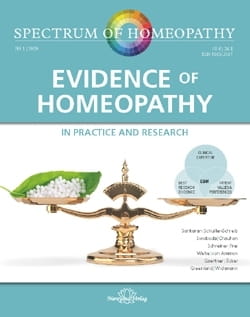Evidence of Homeopathy - Spectrum of Homeopathy 2020/1
In Practice and Research
With this ten-year anniversary issue of SPECTRUM OF HOMEOPATHY we want to offer our readers a review of the state of homeopathic research and the available evidence for homeopathy. For it is now common in public discussion to deny that there is any evidence at all for homeopathy, which is openly defamed and ridiculed. Opponents repeat the objectively false argument that there is no scientific evidence beyond placebo for its effectiveness.
It is a widely shared misunderstanding that evidence-based medicine (EBM) solely rests on scientific studies. As our cover illustrates, evidence-based treatment decisions are about integrating the experience, expectations and preferences of patients with the clinical expertise of the doctors and the knowledge generated by studies. The fact that there is consistently high public support indicates the preference of many people for homeopathy. The clinical expertise has been demonstrated by SPECTRUM in recent years with countless case studies.
Four especially impressive cases from our international authors underline that at the level of evidence homeopathy can be effective even in severe pathology such as autoimmune hepatitis, cardiomyopathy, multiple sclerosis, or systemic lupus erythematodes. All aspects of EBM are covered by Heiner Frei with his work on the treatment of ADHD. Here the fears over the side effects of Ritalin combined with the long-term practical experience of this paediatrician and the encouraging results of a highly regarded randomized double-blind study lead many patients and their parents to make a clearly evidence-based decision in favour of homeopathic treatment.
Whoever still talks of the placebo effect in the face of such a wealth of evidence – according to one of our authors who works in scientific research – cannot read the data. Her team tested the effect of high potencies using both refined experimental plant models in basic homeopathic research and a comprehensive meta-review of the clinical research. The trend here in homeopathy, as in other areas of medicine, is clearly towards investigating study designs that test the effectiveness of therapeutic interventions under conditions as close to real life as possible. Since randomized double-blind studies on the efficacy of a treatment often provide few clues for clinical applications, researchers now tend to favour comparative effectiveness research with the aim of guiding specific clinical decisions for patients as well as for health policy.
For many colleagues, homeopathy as a holistic and immaterial treatment method should not even be judged by the standards of natural scientific and materialist medicine. Yet even if the spiritual effect of a remedy cannot be measured, precise observation and conscientious documentation remain the basis of homeopathic practice and research, and will continue in future to be essential characteristics of our journal and its authors.
- Author: Narayana Verlag
- ISBN: No ISBN
- 96 pages
- Paperback
- Published in 2020
- Printed in Germany

